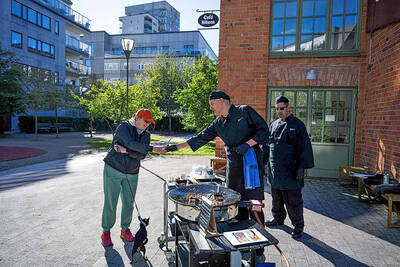Britain's battle against the drugs trade in southern Afghanistan has been a total failure, the country's vice president said yesterday.
The drugs eradication policy is simply too soft and it is time to get tough, Afghan Vice President Ahmad Zia Massoud wrote in the British weekly newspaper the Sunday Telegraph.
Poppies have spread like ``cancer'' in Helmand Province, where British forces are based, he wrote.
Poppy cultivation was a problem best left for Kabul to sort out, the younger brother of iconic slain warrior Ahmad Shah Massoud said.
He wrote: "I have no doubt that the efforts of Britain and the international community in fighting the opium trade in Afghanistan are well-intentioned and we are grateful for their support."
"But it is now clear that your policy in the south of our country has completely failed ... Hundreds of millions of pounds have been spent over the last five years, the UK contributing 262 million pounds [US$528 million], the United States about 1.6 billion dollars," he wrote
"Yet United Nations figures show that opium production increased by 34 percent last year and more than doubled in the last two years," he wrote.
"Helmand, where the British are based ... now produces half of Afghanistan's opium," he wrote.
Britain has around 7,000 troops in Afghanistan. British military commanders are reluctant to get involved in anti-drugs operations, fearing it would drive farmers into the arms of Taliban rebels, the Sunday Telegraph said.
Massoud said redevelopment work, such as improving roads, had helped farmers get their produce to markets -- but also made it easier for them to transport opium.
"The counter-narcotics policy has been much too soft. We are giving too much `carrot' and not enough `stick,'" he wrote.
"Eradication was so low last year, at only about 10 percent of the crop, that it hardly made an impact on the production and will not be enough to deter farmers from planting in the future," he wrote. "Counter-narcotics operations are not in Afghan hands. Poppy cultivation is an Afghan problem and it needs an Afghan solution."
He said Kabul needed to wipe out the "plague" of corruption in state institutions involved in combating narcotics and terrorism.
"I believe we have now reached a critical point in our struggle against the curse of opium, fundamental to the security and future of Afghanistan," he said.
"The opium directly supports those who are killing Afghan and international troops," he said. "This is a vicious circle: Getting rid of the poppy in the south has been difficult because of insecurity, but the insecurity is fuelled by the poppy.
"Failure to achieve a substantial reduction in the opium crop will be equivalent to supporting the Taliban," he wrote.
"The time has come for us to adopt a more forceful approach. We must switch from ground-based eradication to aerial spraying," he wrote.
"This should not create anger against the government, since it is acting with religious and legal justification, nor should it increase rural poverty," he said.

READINESS: According to a survey of 2,000 people, 86 percent of Swedes believe the country is worth defending in the event of a military attack Swedes are stocking up on food items in case of war, as more conflict in Europe no longer feels like a distant possibility, and authorities encourage measures to boost readiness. At a civil preparedness fair in southwest Stockholm, 71-year-old Sirkka Petrykowska said that she is taking the prospect of hostilities seriously and preparing as much as she can. “I have bought a camping stove. I have taken a course on preservation in an old-fashioned way, where you can preserve vegetables, meat and fruit that lasts for 30 years without a refrigerator,” Petrykowska said. “I’ve set aside blankets for warmth, I

FRUSTRATIONS: One in seven youths in China and Indonesia are unemployed, and many in the region are stuck in low-productivity jobs, the World Bank said Young people across Asia are struggling to find good jobs, with many stuck in low-productivity work that the World Bank said could strain social stability as frustrations fuel a global wave of youth-led protests. The bank highlighted a persistent gap between younger and more experienced workers across several Asian economies in a regional economic update released yesterday, noting that one in seven young people in China and Indonesia are unemployed. The share of people now vulnerable to falling into poverty is now larger than the middle class in most countries, it said. “The employment rate is generally high, but the young struggle to

ENERGY SHIFT: A report by Ember suggests it is possible for the world to wean off polluting sources of power, such as coal and gas, even as demand for electricity surges Worldwide solar and wind power generation has outpaced electricity demand this year, and for the first time on record, renewable energies combined generated more power than coal, a new analysis said. Global solar generation grew by a record 31 percent in the first half of the year, while wind generation grew 7.7 percent, according to the report by the energy think tank Ember, which was released after midnight yesterday. Solar and wind generation combined grew by more than 400 terawatt hours, which was more than the increase in overall global demand during the same period, it said. The findings suggest it is

‘ARMED CONFLICT’: At least 21 people have died in such US attacks, while experts say the summary killings are illegal even if they target confirmed narcotics traffickers US forces on Friday carried out a strike on an alleged drug-smuggling boat off the coast of Venezuela, killing four people, US Secretary of Defense Pete Hegseth said. The latest strike, which Hegseth announced in a post on X, brings the number of such US attacks to at least four, leaving at least 21 people dead. An accompanying video shared by Hegseth showed a boat speeding across the waves before being engulfed in smoke and flames. “Four male narco-terrorists aboard the vessel were killed,” the Pentagon chief wrote. He said the strike “was conducted in international waters just off the